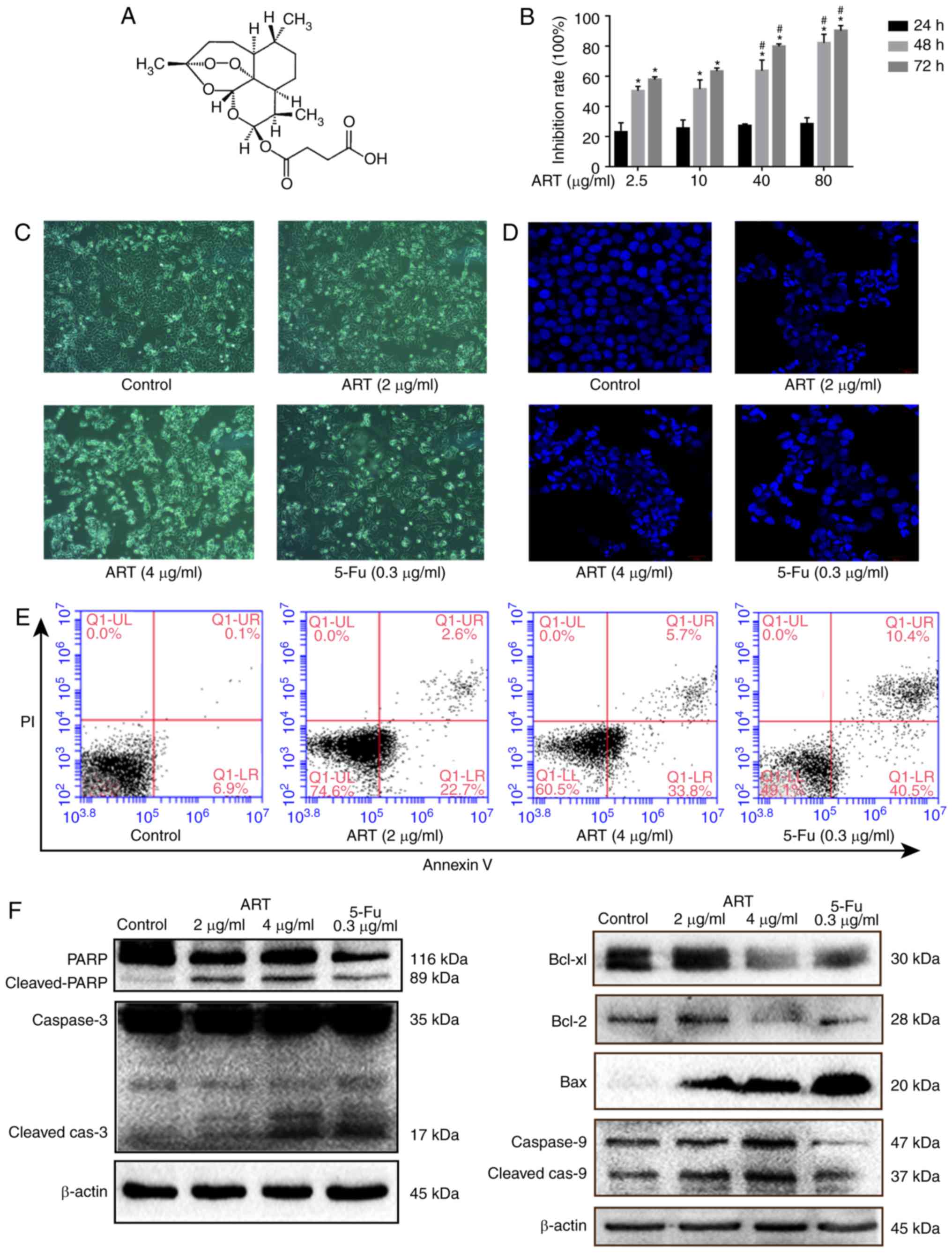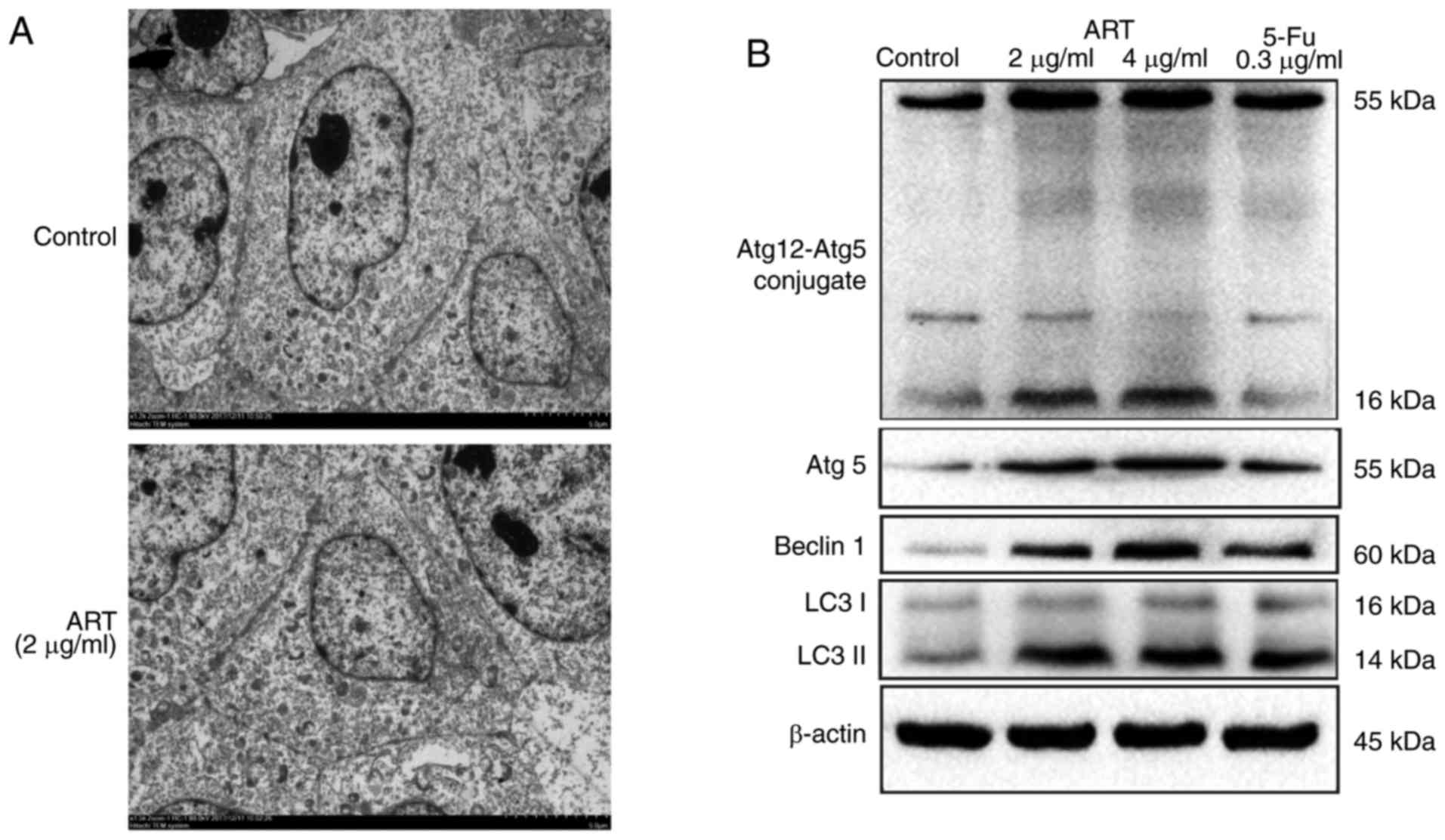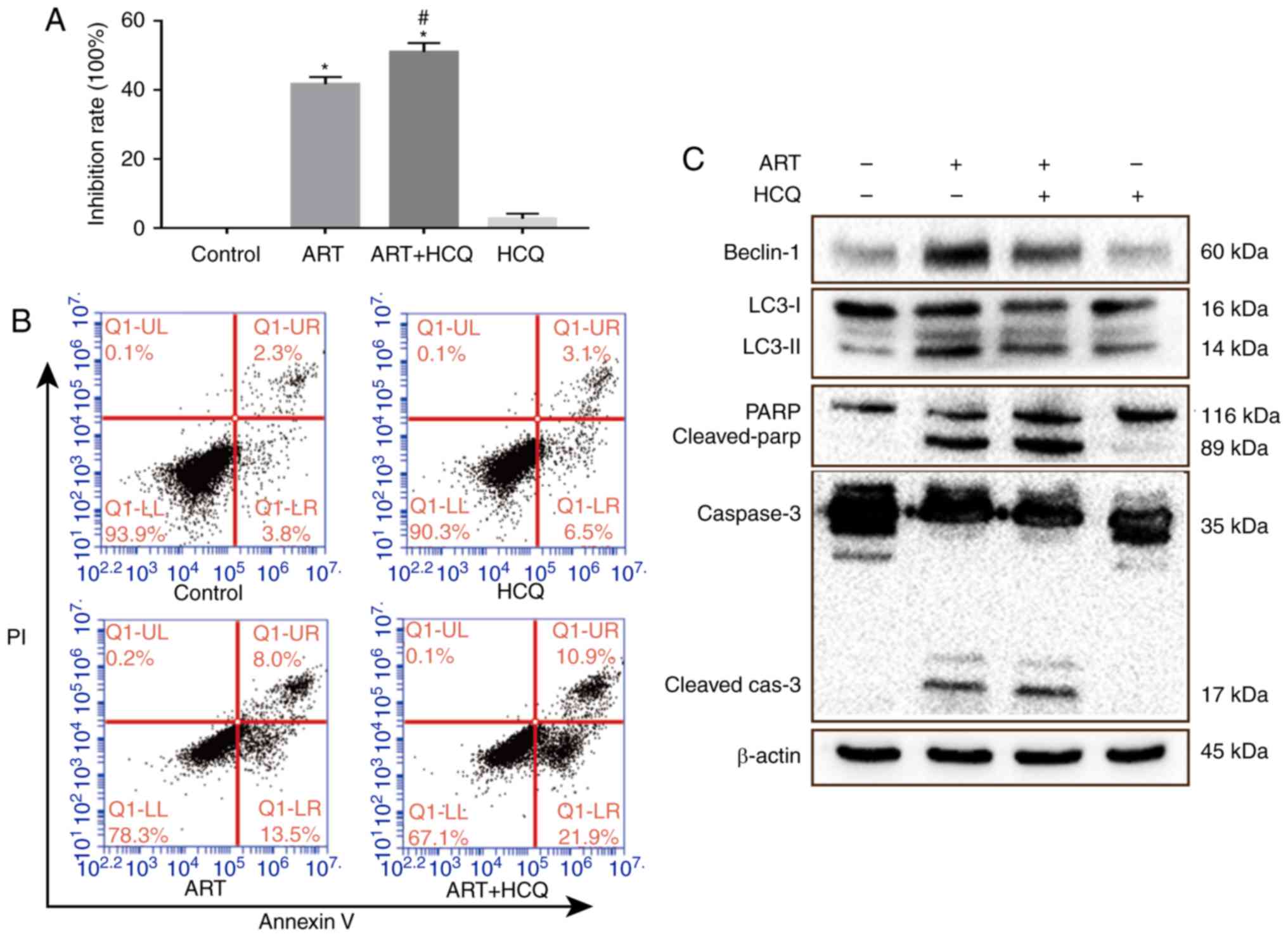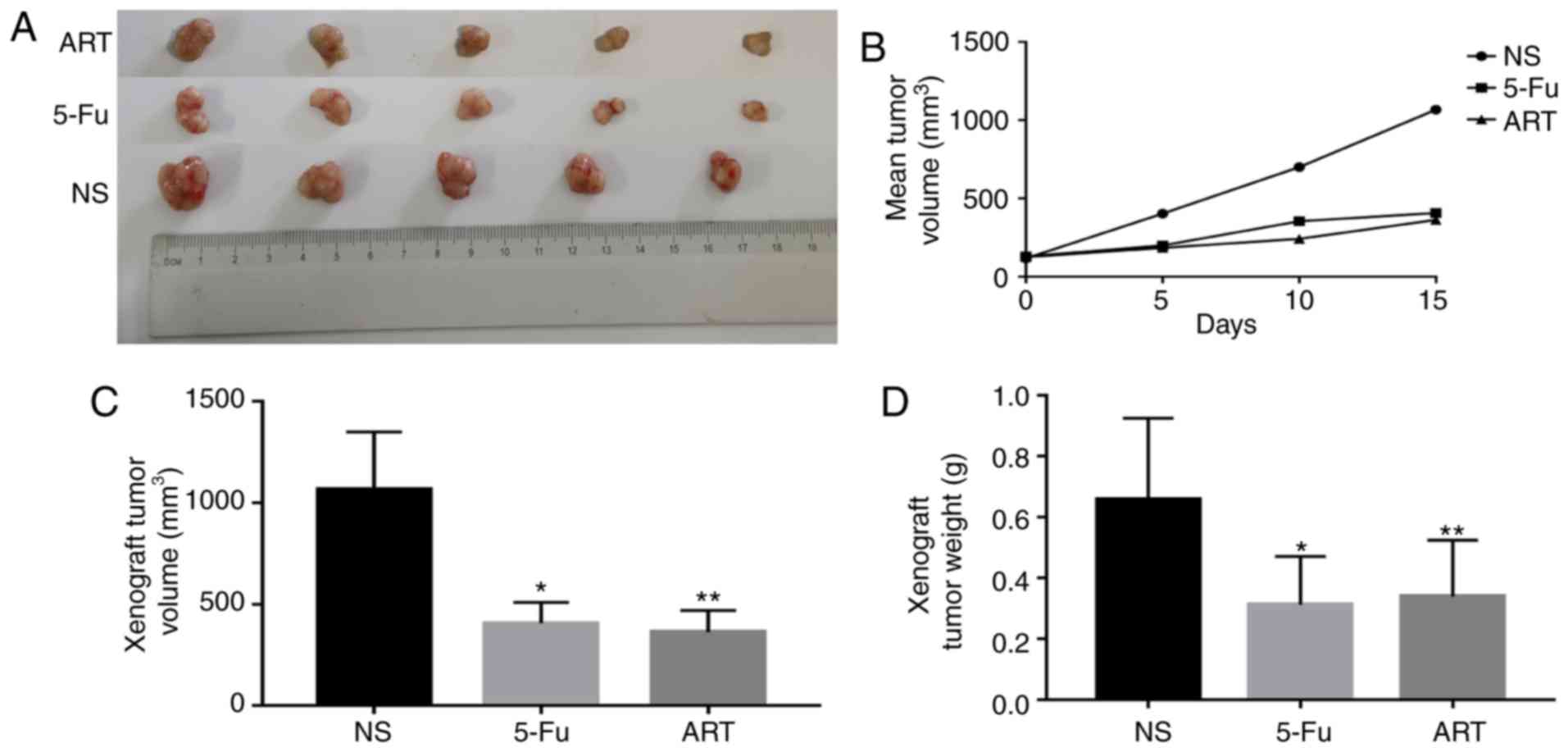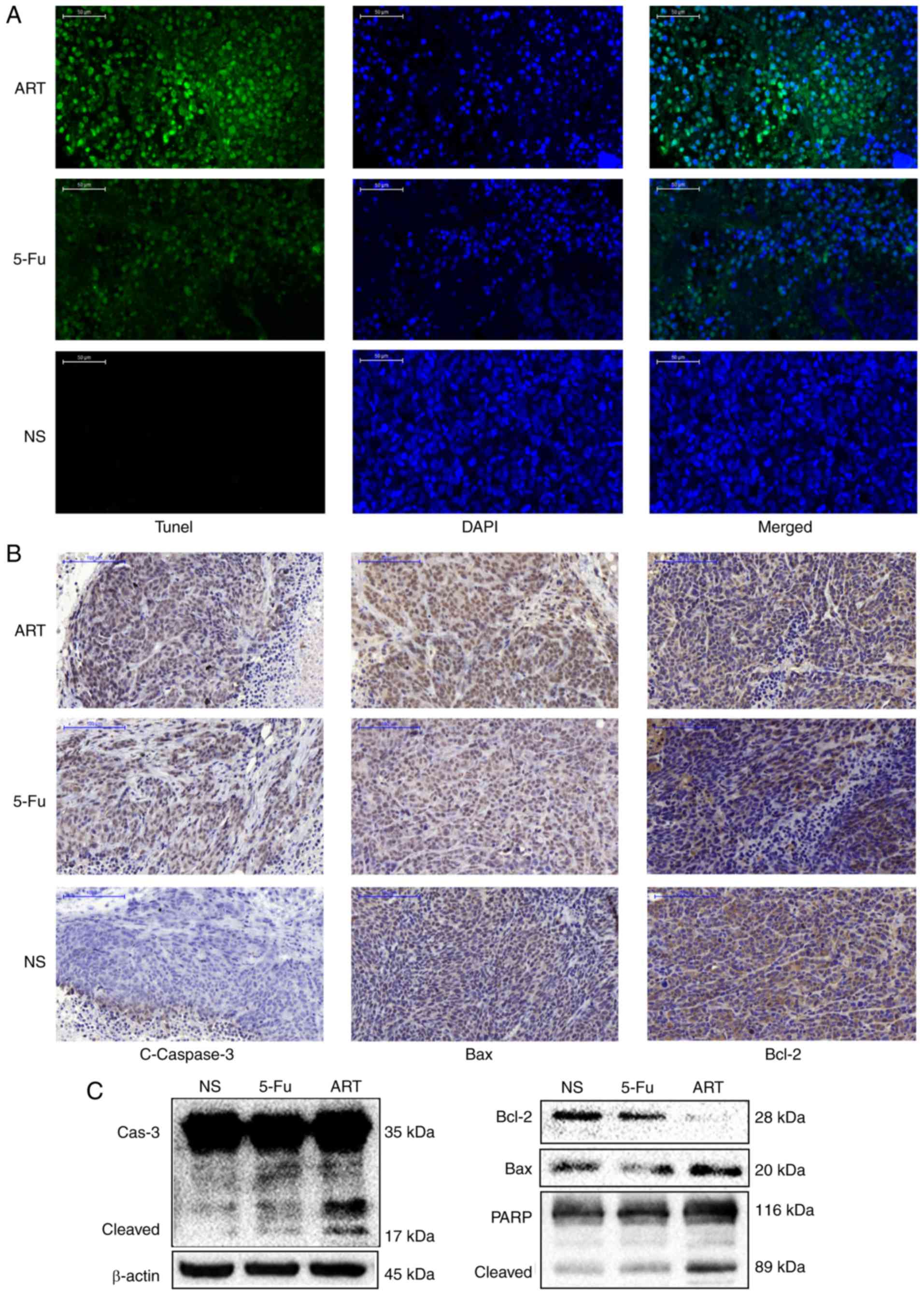|
1
|
Torre LA, Bray F, Siegel RL, Ferlay J,
Lortet-Tieulent J and Jemal A: Global cancer statistics, 2012. CA
Cancer J Clin. 65:87–108. 2015. View Article : Google Scholar : PubMed/NCBI
|
|
2
|
Coghlin C and Murray GI: Biomarkers of
colorectal cancer: Recent advances and future challenges.
Proteomics Clin Appl. 9:64–71. 2015. View Article : Google Scholar
|
|
3
|
Efferth T and Kaina B: Toxicity of the
antimalarial artemisinin and its dervatives. Crit Rev Toxicol.
40:405–421. 2010. View Article : Google Scholar : PubMed/NCBI
|
|
4
|
Efferth T, Rücker G, Falkenberg M, Manns
D, Olbrich A, Fabry U and Osieka R: Detection of apoptosis in KG-1a
leukemic cells treated with investigational drugs.
Arzneimittelforschung. 46:196–200. 1996.PubMed/NCBI
|
|
5
|
Xu N, Zhou X, Wang S, Xu LL, Zhou HS and
Liu XL: Artesunate induces SKM-1 cells apoptosis by inhibiting
hyperactive β-catenin signaling pathway. Int J Med Sci. 12:524–529.
2015. View Article : Google Scholar :
|
|
6
|
Wang Y, Yang J, Chen L, Wang J, Wang Y,
Luo J, Pan L and Zhang X: Artesunate induces apoptosis through
caspase-dependent and -independent mitochondrial pathways in human
myelodysplastic syndrome SKM-1 cells. Chem Biol Interact.
219:28–36. 2014. View Article : Google Scholar : PubMed/NCBI
|
|
7
|
Papanikolaou X, Johnson S, Garg T, Tian E,
Tytarenko R, Zhang Q, Stein C, Barlogie B, Epstein J and Heuck C:
Artesunate overcomes drug resistance in multiple myeloma by
inducing mitochondrial stress and non-caspase apoptosis.
Oncotarget. 5:4118–4128. 2014. View Article : Google Scholar : PubMed/NCBI
|
|
8
|
Kim C, Lee JH, Kim SH, Sethi G and Ahn KS:
Artesunate suppresses tumor growth and induces apoptosis through
the modulation of multiple oncogenic cascades in a chronic myeloid
leukemia xenograft mouse model. Oncotarget. 6:4020–4035. 2014.
|
|
9
|
Wang ZC, Liu Y, Wang H, Han QK and Lu C:
Research on the relationship between artesunate and Raji cell
autophagy and apoptosis of Burkitt’s lymphoma and its mechanism.
Eur Rev Med Pharmacol Sci. 21:2238–2243. 2017.PubMed/NCBI
|
|
10
|
Zuo W, Wang Z-Z and Xue J: Artesunate
induces apoptosis of bladder cancer cells by miR-16 regulation of
COX-2 expression. Int J Mol Sci. 15:14298–14312. 2014. View Article : Google Scholar : PubMed/NCBI
|
|
11
|
Jeong DE, Song HJ, Lim S, Lee SJ, Lim JE,
Nam DH, Joo KM, Jeong BC, Jeon SS, Choi HY and Lee HW: Repurposing
the anti-malarial drug artesunate as a novel therapeutic agent for
metastatic renal cell carcinoma due to its attenuation of tumor
growth, metastasis, and angiogenesis. Oncotarget. 6:33046–33064.
2015. View Article : Google Scholar : PubMed/NCBI
|
|
12
|
Zhang LX, Liu ZN, Ye J, Sha M, Qian H, Bu
XH, Luan ZY, Xu XL, Huang AH, Yuan DL, et al: Artesunate exerts an
anti-immunosuppressive effect on cervical cancer by inhibiting PGE2
production and Foxp3 expression. Cell Biol Int. 38:639–646. 2014.
View Article : Google Scholar : PubMed/NCBI
|
|
13
|
Chen K, Shou L-M, Lin F, Duan WM, Wu MY,
Xie X, Xie YF, Li W and Tao M: Artesunate induces G2/M cell cycle
arrest through autophagy induction in breast cancer cells.
Anticancer Drugs. 25:652–662. 2014.PubMed/NCBI
|
|
14
|
Wang Z, Wang C, Wu Z, Xue J, Shen B, Zuo
W, Wang Z and Wang SL: Artesunate suppresses the growth of
prostatic cancer cells through inhibiting androgen receptor. Biol
Pharm Bull. 40:479–485. 2017. View Article : Google Scholar : PubMed/NCBI
|
|
15
|
Roh JL, Kim EH, Jang H and Shin D: Nrf2
inhibition reverses the resistance of cisplatin-resistant head and
neck cancer cells to artesunate-induced ferroptosis. Redox Biol.
11:254–262. 2017. View Article : Google Scholar :
|
|
16
|
Pang Y, Qin G, Wu L, Wang X and Chen T:
Artesunate induces ROS-dependent apoptosis via a Bax-mediated
intrinsic pathway in Huh-7 and Hep3B cells. Exp Cell Res.
347:251–260. 2016. View Article : Google Scholar : PubMed/NCBI
|
|
17
|
Liu L, Zuo LF, Zuo J and Wang J:
Artesunate induces apoptosis and inhibits growth of Eca109 and
Ec9706 human esophageal cancer cell lines in vitro and in vivo. Mol
Med Rep. 12:1465–1472. 2015. View Article : Google Scholar : PubMed/NCBI
|
|
18
|
Chen X, Wong YK, Lim TK, Lim WH, Lin Q,
Wang J and Hua Z: Artesunate activates the intrinsic apoptosis of
HCT116 cells through the suppression of fatty acid synthesis and
the NF-kappaB pathway. Molecules. 22:E12722017. View Article : Google Scholar
|
|
19
|
Qin G, Wu L, Liu H, Pang Y, Zhao C, Wu S,
Wang X and Chen T: Artesunate induces apoptosis via a
ROS-independent and Bax-mediated intrinsic pathway in HepG2 cells.
Exp Cell Res. 336:308–317. 2015. View Article : Google Scholar : PubMed/NCBI
|
|
20
|
O’Donovan TR, Rajendran S, O’Reilly S,
O’Sullivan GC and McKenna SL: Lithium modulates autophagy in
esophageal and colorectal cancer cells and enhances the efficacy of
therapeutic agents in vitro and in vivo. PLoS One. 10:e01346762015.
View Article : Google Scholar
|
|
21
|
Coker-Gürkan A, Arisan ED, Obakan P,
Akalın K, Özbey U and Palavan-Unsal N: Purvalanol induces
endoplasmic reticulum stress-mediated apoptosis and autophagy in a
time-dependent manner in HCT116 colon cancer cells. Oncol Rep.
33:2761–2770. 2015. View Article : Google Scholar : PubMed/NCBI
|
|
22
|
Ranjan A and Srivastava SK: Penfluridol
suppresses pancreatic tumor growth by autophagy-mediated apoptosis.
Sci Rep. 6:261652016. View Article : Google Scholar : PubMed/NCBI
|
|
23
|
Wang Y, Luo Q, He X, Wei H, Wang T, Shao J
and Jiang X: Emodin induces apoptosis of colon cancer cells via
induction of autophagy in a ROS-dependent manner. Oncol Res. 2017
Jul;25 View Article : Google Scholar
|
|
24
|
Rosenthal PJ: Artesunate for the treatment
of severe falciparum malaria. N Engl J Med. 358:1829–1836. 2008.
View Article : Google Scholar : PubMed/NCBI
|
|
25
|
Clark RL: Embryotoxicity of the
artemisinin antimalarials and potential consequences for use in
women in the first trimester. Reprod Toxicol. 28:285–296. 2009.
View Article : Google Scholar : PubMed/NCBI
|
|
26
|
Oh KJ, Barbuto S, Pitter K, Morash J,
Walensky LD and Korsmeyer SJ: A membrane-targeted BID BCL-2
homology 3 peptide is sufficient for high potency activation of BAX
in vitro. J Biol Chem. 281:36999–37008. 2006. View Article : Google Scholar : PubMed/NCBI
|
|
27
|
Siddiqui WA, Ahad A and Ahsan H: The
mystery of BCL2 family: Bcl-2 proteins and apoptosis: An update.
Arch Toxicol. 89:289–317. 2015. View Article : Google Scholar : PubMed/NCBI
|
|
28
|
Martinou JC and Green DR: Breaking the
mitochondrial barrier. Nat Rev Mol Cell Biol. 2:63–67. 2001.
View Article : Google Scholar : PubMed/NCBI
|
|
29
|
Chaitanya GV, Steven AJ and Babu PP:
PARP-1 cleavage fragments: Signatures of cell-death proteases in
neurodegeneration. Cell Commun Signal. 8:312010. View Article : Google Scholar : PubMed/NCBI
|
|
30
|
Mizushima N: Autophagy: Process and
function. Genes Dev. 21:2861–2873. 2007. View Article : Google Scholar : PubMed/NCBI
|
|
31
|
Hanada T and Ohsumi Y: Structure-function
relationship of Atg12, a ubiquitin-like modifier essential for
autophagy. Autophagy. 1:110–118. 2005. View Article : Google Scholar
|
|
32
|
Kang MR, Kim MS, Oh JE, Kim YR, Song SY,
Kim SS, Ahn CH, Yoo NJ and Lee SH: Frameshift mutations of
autophagy-related genes ATG2B, ATG5, ATG9B and ATG12 in gastric and
colorectal cancers with microsatellite instability. J Pathol.
217:702–706. 2009. View Article : Google Scholar : PubMed/NCBI
|
|
33
|
Zhang Y, Chen P, Hong H, Wang L, Zhou Y
and Lang Y: JNK pathway mediates curcumin-induced apoptosis and
autophagy in osteosarcoma MG63 cells. Exp Ther Med. 14:593–599.
2017. View Article : Google Scholar : PubMed/NCBI
|
|
34
|
Jung HJ, Kang JH, Choi S, Son YK, Lee KR,
Seong JK, Kim SY and Oh SH: Pharbitis Nil (PN) induces apoptosis
and autophagy in lung cancer cells and autophagy inhibition
enhances PN-induced apoptosis. J Ethnopharmacol. 208:253–263. 2017.
View Article : Google Scholar : PubMed/NCBI
|
|
35
|
Hseu YC, Tsai TJ, Korivi M, Liu JY, Chen
HJ, Lin CM, Shen YC and Yang HL: Antitumor properties of Coenzyme
Q0 against human ovarian carcinoma cells via induction of
ROS-mediated apoptosis and cytoprotective autophagy. Sci Rep.
7:80622017. View Article : Google Scholar :
|
|
36
|
Cave DD, Desiderio V, Mosca L, Ilisso CP,
Mele L, Caraglia M, Cacciapuoti G and Porcelli M:
S-Adenosylmethionine-mediated apoptosis is potentiated by autophagy
inhibition induced by chloroquine in human breast cancer cells. J
Cell Physiol. 233:1370–1383. 2017. View Article : Google Scholar : PubMed/NCBI
|
|
37
|
Huang CC, Lee CC, Lin HH, Chen MC, Lin CC
and Chang JY: Autophagy-regulated ROS from xanthine oxidase acts as
an early effector for triggering late mitochondria-dependent
apoptosis in cathepsin S-targeted tumor cells. PLoS One.
10:e01280452015. View Article : Google Scholar : PubMed/NCBI
|
|
38
|
Won SJ, Yen CH, Liu HS, Wu SY, Lan SH,
Jiang-Shieh YF, Lin CN and Su CL: Justicidin A-induced autophagy
flux enhances apoptosis of human colorectal cancer cells via class
III PI3K and Atg5 pathway. J Cell Physiol. 230:930–946. 2015.
View Article : Google Scholar
|
|
39
|
Liu L, Zhao WM, Yang XH, Sun ZQ, Jin HZ,
Lei C, Jin B and Wang HJ: Effect of inhibiting Beclin-1 expression
on autophagy, proliferation and apoptosis in colorectal cancer.
Oncol Lett. 14:4319–4324. 2017. View Article : Google Scholar : PubMed/NCBI
|















